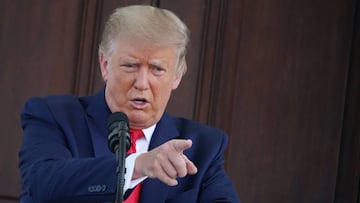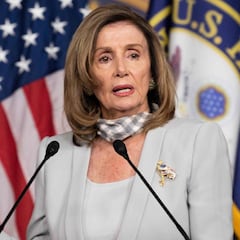Trump: "If Biden wins, China will own this country"
US president Donald Trump launched attacks on his political opponents during a wide-ranging press conference while also discussing a Covid-19 vaccine.

US President Donald Trump launched a fresh verbal attack on China during a wide-ranging press conference at the White House on Monday during which he reiterated his belief that the coronavirus pandemic is largely under control in the United States with the fatality rate “reduced 85 percent since April” while also stating that under his leadership a Covid-19 vaccine would be produced by America in “record time” and the country was “witnessing the fastest labor market recovery from an economic crisis in history.”
- Will Trump sign second stimulus check before US elections?
- How many vaccines could fail according to federal advisers?
- FDA may approve vaccine earlier than expected
- India registers record single-day spike
- Experts fear "deadly December"
"It's going to be -- it's going to be done in a very short period of time. Could even have it during the month of October," Trump said during his White House appearance.
"Contrary to all of the lies, the vaccine -- they're political lies, they'll say anything, and it's so dangerous for our country, what they say -- but the vaccine will be very safe and very effective and it’ll be delivered very soon. You could have a very big surprise coming up and I’m sure you’ll be very happy, the people will be happy, the people of the world will be very happy," Trump said.
Trump: America being "ripped off by friend and foe"
Under President Trump's leadership, we are producing a Coronavirus vaccine in record time. pic.twitter.com/9GelgghzF0
— The White House 45 Archived (@WhiteHouse45) September 7, 2020
Trump also launched a fresh attack on those who he accused of “ripping America off, every nation, friend, foe…” while adding the US had experienced “tremendous growth until we got hit with the China virus.”
With the US election approaching, Trump again raised the idea of separating the US and Chinese economies, also known as decoupling, suggesting the United States would not lose money if the world's two biggest economies no longer did business.
Trump also suggested his administration would prohibit companies that outsource to China from eligibility from Federal contract awards.
Trump: "Decouple, it's an interesting word"
We will make a full recovery and return to unprecedented prosperity through our pro-America policies 🇺🇸 pic.twitter.com/tZ53QKMqDw
— The White House 45 Archived (@WhiteHouse45) September 7, 2020
"So when you mention the word decouple, it's an interesting word," Trump told a Labor Day news conference in which he vowed to bring jobs back to America from China.
"We lose billions of dollars and if we didn't do business with them we wouldn't lose billions of dollars. It's called decoupling, so you'll start thinking about it," Trump said.
Trump, who long touted friendly ties with Chinese President Xi Jinping as he sought to make good on promises to rebalance a massive trade deficit, has made getting tough on China a key part of his campaign for re-election on 3 November.
He has accused his Democratic opponent, Joe Biden, who leads in most opinion polls, of being soft toward Beijing.
"If Biden wins, China wins, because China will own this country," he said.
Biden for his part has criticized Trump's Phase 1 trade deal with China, saying it is “unenforceable,” and “full of vague, weak, and recycled commitments from Beijing."
Trump vowed that in future his administration would prohibit federal contracts with companies that outsource to China and hold Beijing accountable for allowing the coronavirus, which began in China, to spread around the world.
US "to end reliance on China"
We have the GREATEST workforce on earth! 🇺🇸
— The White House 45 Archived (@WhiteHouse45) September 7, 2020
It's never been more important to ensure American workers have high-quality pathways to good jobs & rewarding careers.
Our Pledge to America's Workers: https://t.co/GF0aEL6ehK
"We will make America into the manufacturing superpower of the world and will end our reliance on China once and for all. Whether it's decoupling, or putting in massive tariffs like I've been doing already, we will end our reliance in China, because we can't rely on China," Trump said.
"We will bring jobs back from China to the United States and we will impose tariffs on companies that desert America to create jobs in China and other countries," he added.
Related stories
US Treasury Secretary Steven Mnuchin said in June that a decoupling of the US and Chinese economies would result if US companies were not allowed to compete on a fair and level basis in China's economy.
Other officials and analysts have said that the two countries' economies are so intertwined as to make such a move impractical, but Washington would continue to pressure Beijing to level the playing field.

